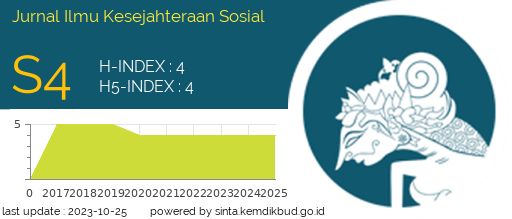DOI
10.7454/jurnalkessos.v21i2.1076
Abstract
This study aims to describe social support in order to fulfill the socio-economic rights of correctional clients. The socio-economic rights are the second generation of human rights groups which focus on the welfare aspect. Assistance as a form of social approach to achieve welfare based on human rights, where clients can identify their own needs, so as to minimize human rights violations and have the opportunity to function socially and live well. The existence of social support from the nearest environment makes the client able to adapt back to the community and be able to develop his potential. The research method is qualitative with descriptive design. Data collection techniques with literature study, in-depth interviews and observations, while the informants in this study were seven adult clients who had worked, two family members of the client, one community leader, and three community mentors. The results of the study illustrate that clients who have worked get good social support from their families and social mentors in the form of support, advice and information that can help clients solve any problems that hinder their potential development. Social support from the community towards the client is still lacking because there is a sense of community indifference towards the fulfillment of the client's economic rights. The community around the client's residence is limited to fulfilling the client's social rights by re-accepting the existence of the client in the environment, but has not paid more attention to the fulfillment of his economic rights. The need for the role of family and community counselors in taking a special approach to society in order to increase community support and remove the negative stigma toward clients, so that the client's socio-economic rights are fulfilled properly.
Bahasa Abstract
Penelitian ini bertujuan untuk mendeskripsikan dukungan sosial guna pemenuhan hak sosial ekonomi klien pemasyarakatan. Hak sosial ekonomi merupakan kelompok HAM (Hak Asasi Manusia) generasi kedua yang menitikberatkan pada aspek kesejahteraan. Pemberian dukungan sebagai bentuk pendekatan sosial guna mencapai kesejahteraan yang berlandaskan pada HAM, dimana klien dapat mengidentifikasi sendiri kebutuhannya, sehingga mampu meminimalkan pelanggaran HAM dan memiliki kesempatan untuk berfungsi secara sosial serta hidup sejahtera. Adanya dukungan sosial dari lingkungan terdekat membuat klien mampu beradaptasi kembali di masyarakat dan mampu mengembangkan potensi dirinya. Metode penelitian adalah kualitatif dengan desain deskriptif. Teknik pengumpulan data dengan studi literatur, wawancara mendalam dan observasi, sedangkan informan dalam penelitian ini adalah tujuh orang klien dewasa yang telah bekerja, dua orang anggota keluarga klien, satu orang tokoh masyarakat, dan tiga orang pembimbing kemasyarakatan. Hasil penelitian menggambarkan bahwa klien yang telah bekerja mendapatkan dukungan sosial yang baik dari keluarga dan pembimbing kemasyarakatannya berupa dukungan dan motivasi, saran dan informasi yang dapat membantu klien dalam memecahkan setiap persoalan yang menghambat pengembangan potensi dirinya. Dukungan sosial dari masyarakat terhadap klien masih kurang karena ada rasa ketidakpedulian masyarakat terhadap pemenuhan hak ekonomi klien. Masyarakat sekitar tempat tinggal klien hanya sebatas memenuhi hak sosial klien dengan menerima kembali keberadaan klien di lingkungan, namun belum memberikan perhatian lebih terhadap pemenuhan hak ekonominya. Perlunya peran keluarga dan pembimbing kemasyarakatan dalam melakukan pendekatan khusus kepada masyarakat guna meningkatkan dukungan masyarakat dan menghapus stigma negatif terhadap klien, sehingga hak sosial-ekonomi klien terpenuhi dengan baik.
Recommended Citation
Setyani, Dina and Nugroho, Fentiny
(2020)
"Dukungan Sosial Guna Pemenuhan Hak Sosial Ekonomi Bagi Klien Pemasyarakatan di Balai Pemasyarakatan Kelas I Jakarta Pusat.,"
Jurnal Ilmu Kesejahteraan Sosial: Vol. 21:
No.
2, Article 1.
DOI: 10.7454/jurnalkessos.v21i2.1076
Available at:
https://scholarhub.ui.ac.id/jiks/vol21/iss2/1
Included in
Community-Based Learning Commons, Community-Based Research Commons, Community Health Commons, Counseling Commons, Disability Studies Commons, Family, Life Course, and Society Commons, Gerontology Commons, Inequality and Stratification Commons, Marriage and Family Therapy and Counseling Commons, Nonprofit Studies Commons, Organization Development Commons, Other Mental and Social Health Commons, Social Justice Commons, Social Policy Commons, Social Psychology and Interaction Commons, Social Welfare Commons, Social Work Commons, Substance Abuse and Addiction Commons




